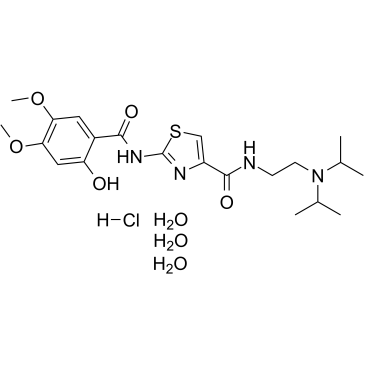Acotiamide monohydrochloride trihydrate |
| Catalog No.GC38732 |
Acotiamide monohydrochloride trihydrate is an orally active, selective and reversible acetylcholinesterase (AChE) inhibitor, with IC50 of 1.79 μM.
Products are for research use only. Not for human use. We do not sell to patients.

Cas No.: 773092-05-0
Sample solution is provided at 25 µL, 10mM.
Acotiamide monohydrochloride trihydrate is an orally active and first-in-class gastroprokinetic agent for the treatment of functional dyspepsia. Acotiamide monohydrochloride trihydrate enhances acetylcholine released by enteric neurons through muscarinic receptor antagonism and acetylcholinesterase (AChE) inhibition, thereby enhancing gastric emptying and gastric accommodation[1][2].
In in vitro studies, Acotiamide inhibits acetylcholine-induced activation of muscarinic M1 and M2 receptors in transformed Xenopus oocytes, with IC50 values of 1.8 and 10.1 μM, respectively. Acotiamide shows no/limited affinity for serotonin 5HT2, 5HT3 or 5HT4 receptors and dopamine D2 receptors[1].Acotiamide inhibits AChE activity, inhibits both the slow (competitively) and fast (noncompetitively) inward currents induced by acetylcholine, enhances electrically stimulated contraction of gastric fundus and gastric body, facilitates acetylcholine release from enteric neurons and, using patch-clamp techniques, potentiates L-type voltagedependent Ca2+ current and inhibits GABA-induced current in area postrema neurons[1].
In in vivo animal models, Acotiamide stimulates postprandial gastroduodenal and/or colonic motor activity, and improves delayed but not normal gastric emptying. For example, Acotiamide significantly improves delayed gastric emptying and feeding inhibition in a restraintstress-induced rat model, but does not affect normal gastric emptying or feeding in intact rats[1].
[1]. Nowlan ML, et al. Acotiamide: first global approval. Drugs. 2013 Aug;73(12):1377-83. [2]. Attia KAM, et al. Spectrofluorimetric determination of acotiamide hydrochloride trihydrate in the presence of its oxidative degradation product. Luminescence. 2018 Jun;33(4):806-811.
Average Rating: 5 (Based on Reviews and 39 reference(s) in Google Scholar.)
GLPBIO products are for RESEARCH USE ONLY. Please make sure your review or question is research based.
Required fields are marked with *




















